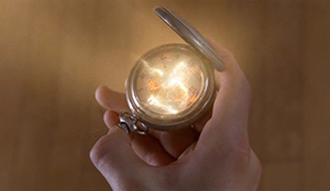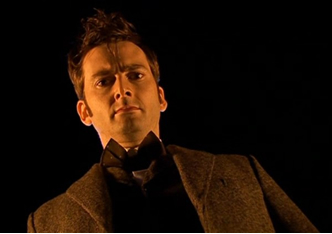Fourth ‘Doctor’ Season Brings New Alien Agendas, Part 2
Last week’s column (my first in a long time on Speculative Faith) focused on not-so-hidden intellectual invasions inherent in Doctor Who, courtesy of the British sci-fi programme’s head writer/producer, Russell T. Davies.
His goals were made more explicit in a British newspaper’s article early last month, as the series’ fourth season was underway: Davies gushes, for example, over a guest appearance by angry Atheist Richard Dawkins in a forthcoming episode, and claims directly that he hopes young boys will imitate one series character’s example and declare their own homosexuality.
However, I’m actually not going to undertake another one of those anti-culture Christian rants, like the kind you read about in email forwards. To be sure, Christendom often needs those sorts of rants (even in email forwards), to oppose truly harmful movies, television programs or other art forms, politicians, organizations or whatever. This column, continued from last week, just isn’t going to be one of them.
Instead, the Doctor practices such heroism and wages true battle against evil influences, resembling Christ like other famous fictitious Christlike-figures, that it’s well worth seeing.
This meat may have indeed been sacrificed to idols by its makers (a la 1 Corinthians 10: 23-33), in the hope of furthering anti-Christian agendas. But Biblical truths are there in these epic stories anyway — like the time-traveling TARDIS ship itself, surrounded by a perception filter, it seems the writers may just not be able to see such “spiritually discerned” elements.
Echoes of the true Time Lord
 For those unfamiliar, the Doctor is a 900-year-old “Time Lord,” the last of a benevolent species of time-traveling aliens from the planet Gallifrey. In the new series, he is the (almost) last of his kind, following a great war between the Time Lords and the evil Daleks. Roaming time and space in his fantastic time-ship, the TARDIS, the Doctor repeatedly finds himself saving the Earth and universe, often with the aid of one or more human companions.
For those unfamiliar, the Doctor is a 900-year-old “Time Lord,” the last of a benevolent species of time-traveling aliens from the planet Gallifrey. In the new series, he is the (almost) last of his kind, following a great war between the Time Lords and the evil Daleks. Roaming time and space in his fantastic time-ship, the TARDIS, the Doctor repeatedly finds himself saving the Earth and universe, often with the aid of one or more human companions.
Previous Spec-Faith columns, including this one and this by guest blogger Jim Black, have pointed out how the Doctor might well be called a “Messiah” in some circumstances. Any character, of course, can be shown as saving the world just as the true God-Man Hero, Christ Jesus, is truly saving it. Yet the Doctor often does so in a manner that tributes — imitates, though not in a blasphemous way — the real Lord of Time, Who not only travels within the vortex of eternity, but created Time itself and dwells infinitely beyond its limitations.
Perhaps the most poignant portrayal I recently saw was in the third-season episode The Family of Blood, part 2 of a 2-part adventure. The Doctor and his human colleague, Martha Jones, have hidden away in 1913 England to avoid the titular Family, a group of aliens who want to kill him. Because this species can detect his presence by smell, the Doctor has temporarily transformed himself into a human, storing all his Time Lord characteristics and memories in a special fob watch that can only be opened at the proper time.
 A boy at the school at which the Doctor (in his human incarnation as a professor) teaches, takes the watch and discovers its secret. While the aliens finally do invade and wreak their carnage, the boy keeps the watch to himself, until finally he gives it to the Doctor.
A boy at the school at which the Doctor (in his human incarnation as a professor) teaches, takes the watch and discovers its secret. While the aliens finally do invade and wreak their carnage, the boy keeps the watch to himself, until finally he gives it to the Doctor.
He did not want to give up the watch at first, he explains, because he found that at first, the Doctor was a terror to behold. “He’s like fire and ice and rage,” Tim explains in quiet awe, tinged with lingering fear. “He’s like the night and the storm in the heart of the sun. . . . He’s ancient and forever. He burns at the center of time and can see the turn of the universe. . . . And — and he’s wonderful.”
If that wasn’t enough for a terrible-and-yet-beautiful Messianic meme, the manner in which the Doctor finally returns to his true form and dispatches the evil alien Family is even more so.
 After the Family’s spaceship is destroyed and the Doctor stands tall and angry over the hunters who are now the hunted, the son of the Family — “Son of Mine” — unexpectedly enters the story for a voiced-over summary of what happened next.
After the Family’s spaceship is destroyed and the Doctor stands tall and angry over the hunters who are now the hunted, the son of the Family — “Son of Mine” — unexpectedly enters the story for a voiced-over summary of what happened next.
He never raised his voice. That was the worst thing — the fury of the Time Lord. And then we discovered why: why this Doctor, who had fought with gods and demons, why he had run away from us and hidden. He was being kind.
He wrapped my father in unbreakable chains forged in the heart of a dwarf star. He tricked my mother into the event horizon of a collapsing galaxy to be imprisoned there, forever. He still visits my sister, once a year, every year. I wonder if one day he might forgive her, but there she is. Can you see? He trapped her inside a mirror. Every mirror. If ever you look at your reflection and see something move behind you just for a second, that’s her. That’s always her.
As for me, I was suspended in time and the Doctor put me to work standing over the fields of England, as their protector.
We wanted to live forever. So the Doctor made sure we did.
And that — reflecting and portraying the truth of God’s wrath and eternal punishment of evildoers — is something more intentionally “Christian” fiction would do well to emulate.
Messages like these are happening even while Davies and others are trying to push a gay-rights agenda or de facto evolutionary propaganda. It’s not just religious symbolism — a hymn sung in the episode Gridlock, or a cross-shaped space station or angelic figures — that makes the program convey Biblical truth. It’s incidental portrayals of God Himself, in the most surprising ways — and in fantastic, awesome ways that Christians can appreciate.
So bring on your gay-rights not-so-subtext Russell T. Davies, and fall down along with others and “worship” professional God-hater Richard Dawkins if you wish to. I don’t mind at all; with the true Time Lord’s help, I can see Him there, and avoid the junk.
However, hmm, perhaps Dawkins could be cast as a villain, or at least a victim who’s among the first to go during another alien invasion. I wouldn’t mind, in the slightest, seeing a Dalek “ex-terrrrr-min-ate!” his character. Yes. In slow motion. Because the fury of the real Time Lord is indeed unmatched against rebels who defy Him — yet He can be kind, and even the rebels can reflect His truths in epic storytelling, whether they want to or not.









































Amen!